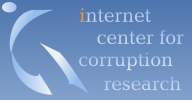| July 10, 1995 | The TI-Internet Corruption Perception Index is first published in "Der Spiegel", 28/1995 |
| July 15, 1995 | An international press release follows the first publication. Several international news agencies (Reuters, DPA ...) spread the ICR in the world. |
| July 11-25, 1995 | After the first publication of the ICR, numerous papers in the world cover this topic. So far, publications in the leading newspapers and magazines in Norway, Finnland, Switzerland, Brazil, Chile, Spain, Italy, Australia, Indonesia, Philippines and Taiwan are explicitely known to us. |
| July 27, 1995 | Some of the worst scoring countries feel pressured by their ranking. Fearing for their reputation, the governments in Indonesia and the Philippines officially reject their score. |
| August 1, 1995 | The following comment was provided to us (the source remains confidential): |
| I agree with the ranking for the Western Hemisphere, which is the area where I have specialized, with the exception of Argentina which should be -2, in my opinion. That is about the same level as Colombia and Mexico. I have worked with Latin American countries for the past 28 years and your degree of accuracy is surprising. |
| August 13, 1995 | After indian newspapers report about the ranking, the New York Times reacts with a covering. |
| August 14, 1995 | The following comment was provided. The source remains confidential: |
| I am wondering how you could rank Singapore as one of the least corrupt nations -- on a par with Denmark, for example -- when, according to press accounts, it is a country that stifles the press with oppressive libel verdicts, is run as a self-perpetuating family dictatorship and it uses physical torture to rein in its populace. I mean, its only evidence of lack of corruption is that it obeys its own illegitimate laws. How does your scale evaluate the corruption inherent in a prime minister handing off his power to his son. You could imagine any of the worst dictatorships not being corrupt if that merely means it is internally consistent. It makes one wonder what practical use such a grading system could be put to. |
| August 14-15, 1995 | The Guardian and the International Herald Tribune report about the Corruption Ranking. The BBC and many other radio stations follow up. |
| August 16-17, 1995 | The Corruption Ranking upsets public opinions in Belgium: |
| "België een van meest korrupte landen in Europa" (De Morgen) |
| August 20, 1995 | The New York Times issues another full report about the Corruption Ranking. |
| August 26, 1995 | Singapore is proud to be ranked third in the corruption poll. |
| "Singapore third cleanest place to do business" (The Straits Times) |
| August 27, 1995 | A public debate in Colombia starts after "El Tiempo" reports about the corruption index. |
| Beginning of September | Many academic requests come in via e-mail. Scientific research concerning the causes and consequences of corruption is high on the agenda |
| September 27, 1995 | The following contribution was sent to us (Source remains confidential): |
| ...To my experience with some of the Japanese, Korean and Singaporean companies, when they work in underdeveloped or developing countries they tend to find the short cut ... [looking] how to circumvent bureaucracies by corrupting officials. Whereas European and American companies really try ... to come clean. The first preference as a matter of fact for mostly western companies is to follow the rule whereas for companies from the above mentioned countries ... to find the short cut and make faster bucks... |
| The fault hence, I feel, is not with the countries [public administration] but with the ethical practices being followed by companies... On this count the people of countries are not a subject matter for the study of corruption but the business actors of the countries are the ones which determine the level of corruption. |
| December 15, 1995 | The following critizism was expressed by a research group from the UK:
We are carrying out research into privatisation in many countries. We collect evidence of corruption. This corruption stems from companies offerring bribes to win privatised business, and we find it happening in every country wherever these companies are bidding. Should not your questions be directed at identifying companies which offer bribes? Then they could be deleted from public sector tender short-lists around the world. |

